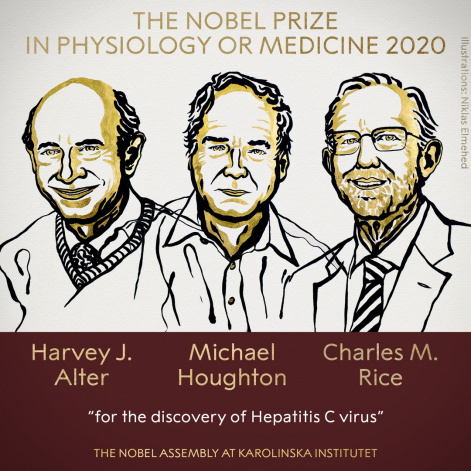Krasnoyarsk scientists about the Nobel prize 2020: medicine and physiology
6 October 2020 г.

Vladislav Tsukanov, Doctor of Medical Sciences, Professor, Head of the Clinical Department of the Research Institute of Medical Problems of the North of the Federal Research Center KSC SB RAS comments on what discovery was awarded the Nobel Prize in Medicine this year, how urgent this problem is nowadays and how modern scientists have solved this problem.
Who was awarded the Nobel Prize in Medicine and Physiology and why?
This year Harvey Alter, Michael Houghton and Charles Rice were awarded the Nobel Prize for their discovery of the hepatitis C virus.
After the causative agents of hepatitis A and B were revealed in the 1970s, the existence of several other viral hepatitis became apparent, to be called non-A, non-B hepatitis (non-A, non-B hepatitis). The methodological studies of transfusion-related hepatitis performed by Harvey J. Alter showed that an unknown virus is a common cause of chronic hepatitis.
A breakthrough in the detection of the causative agent of such hepatitis was made in 1989, when viral RNA which is characteristic of flaviviruses was found in the blood of patients. Michael Houghton used an ingenious strategy to obtain the genome of a new virus called the hepatitis C virus. Charles M. Rice provided definitive evidence that hepatitis C virus causes hepatitis.
How urgent is this problem?
Modern medicine is still seriously concerned about the problem of chronic viral hepatitis C (CHC). This infection, according to the World Health Organization (WHO), affects 1% of the world's population, which is about 71 million people. This number includes a large number of people of young and working age. The disease acquires a long erased course with the possible development of fibrosis, liver cirrhosis and hepatocellular carcinoma (i.e., the most common primary malignant liver tumor). All this leads to an increase in disabilities, deaths and economic losses. Therefore, scientific medical communities pay great attention to research in this area. WHO has proposed a global health sector strategy to end hepatitis C by 2030.
In recent years, there has been a revolutionary leap in the effectiveness of the CHC treatment. The introduction of direct antiviral drugs made it possible to obtain a response to treatment in 95% -100% of patients, even with liver cirrhosis caused by the hepatitis C virus. In the early 90s of the 20th century, the effectiveness of HCV treatment at best reached 10-15%. It can be assumed that it was the unique breakthrough in HCV treatment in a short time which became the basis for the Nobel Prizes for the discovery of the C virus.
Is hepatitis C research conducted at the Institute of Medical Problems of the North?
The Clinical Department of Digestive System Pathology of the Research Institute of Medical Problems of the North has intensified research in the field of HCV since 2019. For the next 5 years, 2-3 separate scientific tasks in the HCV study are indicated in the state assignment for each year. The reason for this was, first of all, the fact that at present mortality from liver diseases occupies a leading position in the structure of gastroenterological mortality in Russia. For the year 2021 we have the following tasks:
- to investigate the clinical and biochemical manifestations and frequency of liver fibrosis in patients with various etiology of precancerous liver diseases (HCV, opisthorchiasis).
- to determine the phenotypic composition of blood B-lymphocytes by flow cytometry in precancerous liver disease (HCV), depending on the inflammation activity, HCV genotype, viral load and severity of liver fibrosis.
- To study clinical symptoms and indicators of the phenotypic composition of blood T-lymphocytes by flow cytometry in HCV patients with genotype 1 before and after treatment with drugs of direct antiviral action.
Share:
